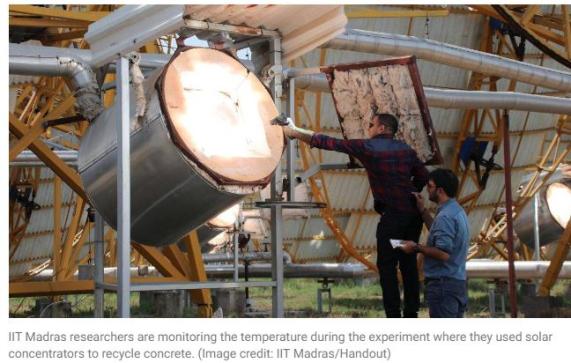
IIT Madras researchers use solar energy to recycle waste concrete
- 17th Jan 2023
-
The Indian Express
IIT Madras researchers have developed a method to use solar thermal energy to recycle concrete waste from construction and demolition sites.
Researchers at IIT Madras have developed and demonstrated a treatment process that uses solar thermal energy to recycle waste concrete from construction and demolition debris. The researchers also discovered that the quality of concrete produced using this method was superior in quality compared to the recycled concrete obtained through mechanical crushing.
The researchers demonstrated the technology at the India One Solar Thermal Power Plant in Rajasthan. The plant has 770 solar concentrators that are used to produce electricity using steam generated at high pressure. The researchers used two of these concentrators during the trial.
The researchers used the large reflectors of the solar concentrators to heat concrete rubble from demolition sites in cast iron receivers. After this, they mechanically scrubbed the material to yield coarse and fine recycled concrete aggregate (RCA). These RCA materials can be used to replace "blue metal" and sand used in concrete construction. Blue metal refers to the hard dark stone crushed into small pieces that is used during the surfacing of roads and concrete construction.
"There are no significant by-products as mostly physical changes occur in the concrete. There could be some emission of water vapour but certainly nothing toxic," said Ravindra Gettu, coauthor of a research paper published in the journal Materials and Structures to indianexpress.com over email. Gettu is a professor at the Department of Civil Engineering, IIT Madras.
According to the Building Materials and Technology Promotion Council, the demand for concrete in India is approximately 380 million tonnes a year. A large portion of the demand for concrete in the country is met by extensive mining and quarrying operations, which apart from depleting important primary resources also leads to the pollution of air, soil and waterways. The researchers hope to meet a part of the country's demand using novel technologies like their concrete recycling method.
With their new method, the IIT Madras researchers have developed a proof of concept that has demonstrated three important things. First, they proved that a required temperature of 500 degrees celsius could be achieved and maintained for a long duration with the solar concentrator setup used.
Second, they demonstrated that the quality of the RCA produced with this method was comparable to those of aggregates produced using an electric furnace. Third, the preliminary testing of the concrete made using the RCA revealed that it is suitable for typical concrete applications.
"The process does not create any significant by-products as mostly physical changes occur in the concrete. There could be some emission of water vapour but there is certainly nothing toxic," added Gettu.
But, as you may have expected, this process is highly susceptible to interruption due to weather events. The process could be unviable during rainy or cloudy days, meaning that waste concrete will have to be stockpiled during such days so that they can be processed later.
Also, since this was a proof-of-concept, its commercial viability still remains to be established. In order for it to be economically viable, there is a need to build large-scale heating plants with solar energy concentrators. But Gettu believes that the running costs could eventually be lower than conventional recycling processes due to the use of solar energy.
Also, even if such a plant were constructed, it will require the setting up of an extensive logistics network for the collection and separation of recyclable concrete from construction and demolition sites.

